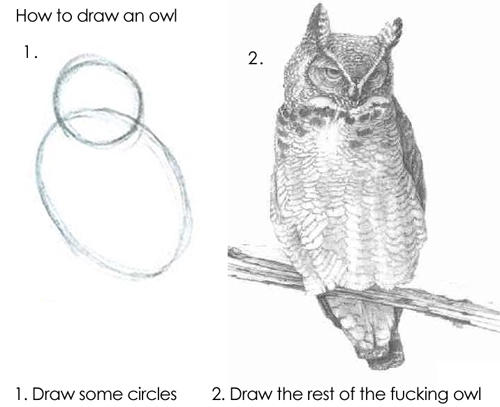Free Kriegsspiel's problem with Owls
In the last 12 or so months, I’ve been delving deep into the FKR rabbit hole. It has thoroughly changed the way I play and let me focus more on adventures than ever before. For example, writing things like stat blocks and looking up rules are now a thing of the past. But there are some issues that I think also need to be addressed. In this post I’m going to talk about something I call the “Owl Problem”.
How hard can it be?
Okay, what’s the deal with bringing owls into this? Well, it’s inspired by the meme above, but related to running rules-light games. In my experience, newcomers to the hobby have almost no issue in joining a session and playing as a PC. However, as a newcomer to running a session, most rules-light games offer little to no guidance.
One central idea to free kriegsspiel is that the referee can just dispense with rules and dice in favor of relying on their experience. This worked out a lot for prussian officers, but a beginner in the ttrpg world doesn't have the same outset. “Play worlds” is a common FKR phrase, where the idea is to inspire people to run based on their understanding of a (fictional) world. But even having watched all the Star Wars movies or read the Witcher novels, you will most likely encounter questions and problems that those worlds don’t directly answer.
For experienced referees, these problems don’t often appear. They can lean on their experience from other systems to handle situations that are idiosyncratic to rpgs. I don’t think this is a widespread problem, but it exists and it’s probably a silent failure. Newcomers take one look at a given game and find little to no guidance beyond how to roll a save or skill check.
Now, it’s not like newcomers are completely helpless either. My youngest son, at an age of six, ran an adventure for me which he called “the Zombie Jungle”. He didn’t stop to ask about movement rates or how much damage a sword should do. We just had a blast and escaped the jungle with lots of treasure on the way. Probably the best advice for a beginner referee is “just do it” and “draw a less shitty owl every time” as it were.
So, in order to alleviate the issue and probably help with a few others, I have some suggestions for people who make rules-light games:
Add examples of play! And make the examples highlight common, but not meaningless situations. Don’t write a column featuring two players solving a math problem. Show what your players do and ask, but also show what the referee is thinking in the situation. Examples of play are typically written as dialogues, so take inspiration from Frank Herbert and write some inner monologue too. I think Jason Tocci wrote a good example of play to go with his 2400 game. Chris McDowall also provide great examples in Into the Odd.
Write something more useful than “what is an rpg?” section that introduces newcomers to the hobby. Maybe put it in a blogpost to accompany the game, where you can spell out some fundamental concepts for your game in more detail. For example, OZR provides very useful guides!.
Add starting adventures to your game! This is not common enough with rules-light games. Great games like OZR, In Darkest Warrens and Dungeon Soul do this. Starting adventures is something I consider like a lego set - they are often small enough to disassemble and put back together, and a beginner referee can easily toy around with them. In other words, they are great for learning more about the game than what your rules spell out.
Finally, point to or make a community that supports your kind of games. I can’t count how many times I’ve answered questions like “what is FKR?” and “what do you do with magic in FKR?”. I’ll gladly answer them again, though. Providing multiple perspectives is also very helpful for beginners!
Also, be kind to owls.





I can imagine a system with a standard basic game and examples of play; an advanced game which teaches a more FK approach through more examples and stripped down character numbers.... and maybe an "expert" game where the system reveals itself as, I don't know, Primeval 2d6 or Target 8. Slowly drawing people down the rabbit hole... :D
ReplyDeleteIdeally I'd like a type of medium that just teaches you to play. Teaching someone a system isn't necessarily the same as teaching them to play, I think. Ideally in an FK game, you wouldn't really care about the system. :)
DeleteAnd so perhaps we are back to a Dave Arneson figure teaching his players by doing; a sort of Blackmoor transmission, like an esoteric inner door martial arts training. Only referees can make referees. :D
ReplyDeleteThere's a certain community of minimalist rpg designers I follow, who are currently chasing a fad for "complete" systems fit onto a single business card. It's a cute stunt, but the terse results (barely more than a couple sentences long) can't be truly called games in any useful sense. I'm hoping they get back to some meaningful design, and take heed of the advice you give here.
ReplyDeleteAre you talking about the Pink Square by chance?
Delete